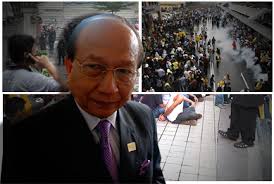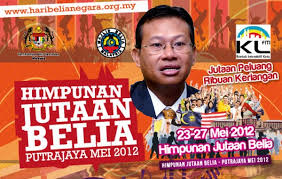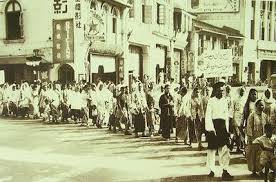In this day and age every President or Prime Minister lives under a never-ending barrage of scrutiny. He won’t engage in any form of activity without the public knowing all of the most intimate details. After all, his schedule has been planned for the whole year in advance.
But sometimes the details made public are only what the press has been instructed to report - in other words, what the public should be told and not what the public should know.
And this is the basis for why an alternative media has sprung, telling a different version of the same event, and allowing the public to use its own common sense to make its own judgment and conclusion.
Despite controlling the media, Najib failed to convince the people
So far, there have been news reports and snap shots of the various political events in the mainstream media, which is all government-controlled - the chief reason why Malaysia has been accused of not having a free press. And by and large, it is in the alternative press that the moves made and the scenarios involving all parties, including the Opposition and the NGOs, have been well publicized rather than in the MSM.

Currently, with the 13th general election looming, the greatest coverage has been on UMNO and Prime Minister Najib Razak. And from the myriads of information, it can be gleaned that the overall picture in Malaysia is not very encouraging and the future is uncertain, despite the ton of overly rosy reports churned out by the mainstream press. Why is it so that despite controlling an awesome channel of newspapers, tabloids, TV and radio stations, Najib and UMNO are seen as corrupt and ineffective?
Indeed, it cannot be denied that Malaysia's alternative media and pro-opposition websites have been extremely effective. The better-funded ones tend to veer towards the UMNO-BN but still give Opposition Leader Anwar Ibrahim and his Pakatan Rakyat opposition due space. The pro-opposition ones work on shoe-string budgets that are often best described as non-existent. Nevertheless, these have been very effective due to individual talent and the ability to pick issues that knock the breath out of Najib and BN, wiping out their credibility.
The combined pressure of the alternative and pro-opposition press has often forced Najib into a corner - in fact, on almost all the issues that have cropped up since he took over as PM in April 2009. The glare has made the public conscious that not everything the PM and his ruling UMNO party proposes are good for the country.
Already worse than Badawi
;)
Najib has now flipped-flopped on so many occasions that pundits say he makes Abdullah Badawi look like a person with firm convictions! Badawi is of course his predecessor who has been nicknamed Malaysia's Sleeping Beauty PM for a tenure marked by mediocrity, which Najib may have already surpassed and many predict will end up with an even more hollow legacy than Badawi.
Nothing that Najib has planned and implemented has been on track or have not stalled half way. After taking over from Badawi, the social, political, economic situations plus the law and order in the country have worsened. For this, Najib has to take the blame as he crystallized the public's doubt over the integrity of judiciary with the Perak power grab.
At this late stage, for a first-term PM not to have already called for a general election really speaks volumes about the support he enjoys. Despite surveys that paint him as the only popular spot in BN, walk into a coffee shop and ask around. Most people will shake their heads and acknowledge that Najib is not the one to lead Malaysia out of the woods.
Within Umno, the bickering, infighting, backstabbing and sabotaging is worsening especially now that Najib appears to have decided to hold GE-13 only after the UMNO internal election. UMNO is in disarray and it has reached the stage where it cannot be covered up anymore.
Every prominent UMNO leader has come to make statements that contradict each other in a bid to steal the limelight. Of this group, none has been more conspicuous as former premier Mahathir Mohamad, who is now regarded as Malaysia's de-facto prime minister. Without Mahathir's support in UMNO, Najib will be out of a job before the year is over.
UMNO leaders striking out for themselves

Even Deputy Prime Minister Muhyiddin Yasin has contradicted Najib on several issues, like being a Malay first and Malaysian second. UMNO Youth Chief Khairy Jamaluddin has no qualms making Najib look like a coward for not taking up a challenge to a public debate with Opposition Leader Anwar Ibrahim.
On his own initiative, Khairy has been debating with PKR director for strategy Rafizi Ramli. He has done it twice - the first in London and the second in KL on PTPTN. These debates which allow the public to evaluate the leadership quantum and quality of the contestants has inadvertently diverted all eyes to Najib and why he keeps saying 'no' to Anwar.

Rais Yatim, in trying to down play the huge gathering at BERSIH 3.0 rally for clean elections, made a fool of himself when he announced that based on the techniques used by the BBC, the number of demonstrators was only 22,741 when the actual was around 250,000.
And someone in UMNO must have instructed the pro-government media to state a crowd of 100,000 attendees to UMNO's 66th anniversary when the actual was less than 50,000.
The video clip shown on the government TV channel portraying BERSIH 3.0 participants as being violent has become such an object of ridicule it has been ignored by the public who prefer to watch 'un-doctored' footage easily available on Youtube, which reveals shocking widespread police brutality against the civilian protesters.

Even UMNO's famed RM300,000 per month cyber troopers have gone quiet. The UMNO ulamas (religious scholars) are also playing dumb, weighed by the burden of trying to make UMNO seem Islamic when the sex and corruption scandals of its leaders are so rampant. Shafie Apdal won't be able to convince many people he did not splurge millions of ringgit on starlet Zahida Rafik.
Najib not only has to live down the scandal of his future in law, Maira Nazarbayev, who purportedly 'stole' a US$20mil super luxury condo from her ex-husband, the spectre of being dragged to testify in the French courts for allegedly having taken a 114mil euros or RM570mil bribe to agree buy 2 Scorpene submarines from DCNS must be ever present in Najib's mind.
Across the nation and in the states too

Ahmad Shabery, who organized the Million Youth Gathering in Putrajaya recently, wasting at least RM20 mil of the tax payers money to create a false impression of UMNO's popularity, is not doing so well either.
Instead of being hailed, Shabery was slammed by incredulous Malaysians who want to know how he could be so irresponsible as to spend RM2 mil to bring in a K-pop group (Korean band) just to ensure that youths did attend the event. When a car drag race was marred by an accident killing 17 onlookers, Shabery did what the ostriches do best - bury his head in the sand!

Meanwhile, FT minister Raja Nong Chik is still at logger heads with fallen Women's minister Shahrizat Jalil. UMNO stalwart Rafidah Aziz is still looking for political opportunities and poking fire although she is now in her early 70s. Rafidah tried to take advantage of Shahrizat's disgrace of the RM250mil NFC corruption debacle by asking her to resign as the Wanita UMNO chief, but Shahrizat managed to persuade Najib to support her.
This has prompted speculation Shahrizat has a 'hold' on Najib and it was most likely to do with a RM1.7mil apartment bought in Kazakhstan allegedly as a wedding gift for Najib's daughter and Maira's son.
;)
Idris Jusoh the ex-Menteri Besar of Terengganu is still busy sabotaging Ahmad Said the current chief minister whenever there is half a chance to do so. In Selangor, UMNO has no suitable candidate for the Menteri Besar position with Mohd Zin the BN election director rejected by Selangor UMNO members, along with the likes of other wannabes such as Noh Omar and Ezam Mohd Noor.
Najib's own cousin and Home Minister Hishamuddin Hussein is not even confident of
;)
contesting in Semberong, where chances are high he will be defeated.
Ghani Othman the Johore Menteri Besar has been holding the post for far too long and several UMNO leaders are now squabbling to topple him, hence the heightened party infighting in the state.
In Perak, the unpopular Zambri Kadir has not been able to give any assurances that the state will remain under

BN after GE-13. If he did, he would only incur sarcasm and rude sniggers.
Sarawak is under the full control of Chief Minister Taib Mahmud and Najib can’t do anything to control him at all. On the contrary, it is Najib who is at Taib’s mercy. While in Sabah, Pakatan Rakyat has been making inroads that they are keeping under wraps until GE-13 is announced on fears that the BN will use money to dismantle their alliances with the local politicians.
Mahathir building a case for violence?

Mahathir has also been actively pointing fingers. He has said that BN is weak now because of Badawi, but that may be because he is prejudiced against Badawi while protective of Najib, whom he feels will serve his vested interests better.
Based on the above scenarios and many more that would take up too much space and time to mention, the chances for BN to win in the GE-13 are drastically reduced even though pro-UMNO analysts insist that the ruling coalition will easily retain the 137 parliamentary seats it holds.
The fact is becoming more apparent UMNO-BN could even be defeated. Disgraced ex-Selangor MB Khir Toyo is confident Selangor, Penang, Kelantan, Kedah and Perak will once again fall to the Pakatan and does not discount the possibility that more states would also be won by Pakatam.
Mahathir is only half-right when he said BN lost five states and saw its majority reduced, NOT because the Opposition is strong but because BN is weak. But affter four years, the public can see for themselves that the Opposition has grown much stronger while UMNO-BN much weaker.
Hence the recent threats by both Mahathir and Najib that there might be violence if there was a regime change. Basically, UMNO has no real plan of its own to stay in power.
So far, it has placed all its eggs with the Election Commission and the police to force a favorable electoral outcome but given the huge response to the Bersih rallies by the Malaysian people and international community, civil servants including the cops are no longer that keen to cheat for the sake of keeping UMNO and BN in power. Nobody wants to be blamed or be caught for cheating when the impending disaster for UMNO is becoming nlearer by the day.
Of course UMNO will still cheat and make the GE-13 the most dirty general election ever. But that can no longer guarantee UMNO-BN victory, hence Najib's flip-flopping over the timing of the GE-13.
Coming to grips with the possibility of losing and making exit plans

So it is that UMNO has to face the prospect of losing. It was an extra 'burden' for UMNO's ruling elite to plan an exit strategy, but they have done so. The first thing they have grabbed is, of course, the CASH. Pundits point to the slew of deals hammered out to Syed Mokhtar, the billionaire crony whom it is believed UMNO is privatizing national assets at a sharp discount, allegedly so that he can keep the money for them!
Since UMNO has the experience of instigating the May 13, 1969 racial riots, it is not impossible it will try to use

the same tactic again to stay in power. But the people are by now savvy enough to read UMNO's outdated racial games.
Make no mistake. May 13 is a huge risk for Najib. Mahathir may encourage it but it is Najib who as PM will have to take responsibility if the riots go out of control. For sure, he will destroy his own legacy and family name if he tries to use force as in the Perak crisis.
Malaysian people have shown through Bersih 2.0 and 3.0 they are not to be toyed with, and will stand up to the BN regime if it tries to be extreme.
Eventually, it is the people who will gently force UMNO-BN to leave Putrajaya. The signs are already clear and UMNO is learning the hard way that this is a decision they have to respect. Most Malaysian have already made up their minds to go for change and will vote for the Pakatan.
In the end, Najib and UMNO have only themselves to blame. It is in their hand to decide the sort of action they wish to take, but chances are they will come to their senses, dump Mahathir who appears intent on violence to protect himself and his family's huge wealth, and pass over the reins in a peaceful manner.
Malaysia Chronicle
 A permalink (or permanent link) is a URL that points to a specific blog entry after it has passed from the front page to the archives.Blogger generates this permanent link based on your post title(If the title is in English). For example if your post title is “Hello World”, the blog post’s permalink would be something like http://yourblog.blogspot.com/2012/06/hello-world.html Till date Blogger never allowed the user to control what the permalink should be but it rather assigned a permalink on it’s own.
A permalink (or permanent link) is a URL that points to a specific blog entry after it has passed from the front page to the archives.Blogger generates this permanent link based on your post title(If the title is in English). For example if your post title is “Hello World”, the blog post’s permalink would be something like http://yourblog.blogspot.com/2012/06/hello-world.html Till date Blogger never allowed the user to control what the permalink should be but it rather assigned a permalink on it’s own.